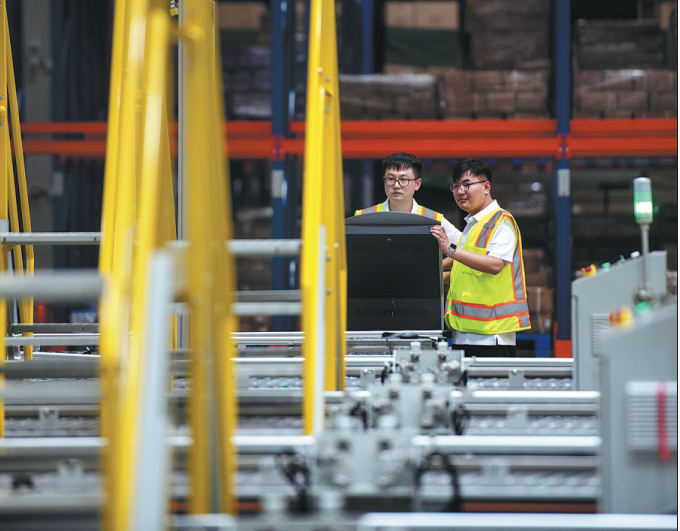
McDonald’s China has partnered with its major suppliers to make its famed burgers at a single production base, in a bid to meet its target of opening 1,000 new fast food outlets in the country every year.
The move is expected to make its burgers safer, fresher and more value-for-money for consumers in China, its top executive said.
In collaboration with its four major suppliers — Bimbo QSR, XH Supply Chain, Tyson Foods Inc, and Zidan — the fast-service catering chain announced the official start of operations at the McDonald’s China Hubei Smart Food Industrial Park on July 3.
The strategic move aims to enhance production capacity and optimize supply chains amid fierce competition in China’s fast-service catering sector.
The industrial park integrates key functions such as food production, environmentally friendly packaging and smart logistics. It is expected to produce 34,000 metric tons of meat products, 270 million buns, 30 million pastries and 2 billion packaging products annually.
A 25,000-square-meter automated warehouse for frozen, refrigerated, and dry goods is also part of the facility, reducing logistics time — from manufacturing sites in the park to the distribution center — by 90 percent.
Featuring a smart supply chain, the park connects production, logistics and restaurants, enabling end-to-end visibility, risk management, and flexible schedules.
Over 70 percent of the processes are automated, enhancing efficiency and stability for McDonald’s restaurants in Central and West China.
Phyllis Cheung, CEO of McDonald’s China, said, “We will continue to innovate and lead in green development, offering fresher, safer and more value-for-money foods and experiences to our customers.”
Environmental sustainability is a cornerstone of the new park. It employs renewable energy sources, eco-friendly building materials and energy conservation measures. A 50,000-square-meter distributed photovoltaic system generates over 10 million kWh annually, and nine factory buildings are slated to receive LEED Silver certification.
McDonald’s China has experienced rapid growth since it put in place a new shareholding structure in 2017. As of June 2024, the company operates over 6,000 restaurants and employs over 200,000 people, making China the second largest and fastest-growing market in McDonald’s global system by restaurant number.
In 2023, McDonald’s China announced its ambition to operate 10,000 restaurants by 2028. To support this expansion plan, McDonald’s and its suppliers have invested over 12 billion yuan from 2018 to 2023 to develop new production capacities and enhance supply chain sustainability.
The smart industrial park allows McDonald’s China and its suppliers to share information, enable traceability of foods and processes, monitor performance and efficiency, and optimize planning through algorithms.
The automated distribution center’s control hub analyzes inventory and supplier capacity in real time, automatically replenishing stocks based on demand forecasts.
Utilizing internet of things, location and navigation technologies, and big data, the cold chain transportation system ensures comprehensive visual monitoring of key details like product type, quantity, temperature, humidity, status and location to ensure food safety and quality.
Digital tools manage inventory and shelf life upon delivery to McDonald’s restaurants, minimizing food safety risks and waste.
wangzhuoqiong@trulynews.cn